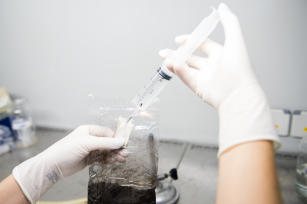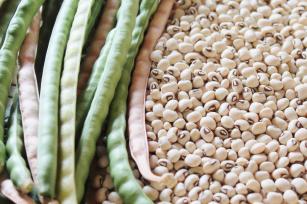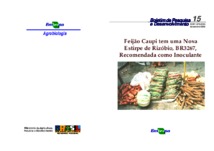Increased range of benefits from rhizobium inoculant technology for family farming in the North of Ghana
Increased range of benefits from rhizobium inoculant technology for family farming in the North of Ghana

Photo: MACEDO, Aline V. de
Northern Ghana is the most important region of this African country for the production of cereals and legumes, but the soils are degraded and lack nitrogen and phosphorus, basic nutrients for the growth of such crops. Previous projects therein had proven that the use of quality inoculants can improve nodulation and increase grain production by 30% to 50%. This project aimed to effectively increase the yields of cowpeas, peanuts and soybeans for smallholders in the region, based on the use of locally produced rhizobium inoculants jointly with strategic phosphorus fertilizer applications.
The Savannas Agricultural Research Institute has already set up an inoculant factory North of Ghana, with frunds from the Alliance for the Green Revolution in Africa, in order to facilitate the distribution and the supply of inoculants at a low cost for suppliers of agricultural inputs and develop awareness of their benefits among farmers. In addition, mbrapa Agrobiology - through M-BoSs: building on successes of the MKTPlace - had been working towards strengthening the skills of the Ghanese professionals allocated in the inoculant production unit, implementing quality control and validating the effectiveness of the product in the field.
The M-BoSs platform is a partnership between the Bill and Melinda Gates Foundation, the British Department for International Development (DfID), the Forum for Agricultural Research in Africa (FARA) and Embrapa, including the support of the Brazilian Ministry of External Relations' Cooperation Agency (ABC) and Funarbe.
The Savannas Agricultural Research Institute has already set up an inoculant factory North of Ghana, with frunds from the Alliance for the Green Revolution in Africa, in order to facilitate the distribution and the supply of inoculants at a low cost for suppliers of agricultural inputs and develop awareness of their benefits among farmers. In addition, mbrapa Agrobiology - through M-BoSs: building on successes of the MKTPlace - had been working towards strengthening the skills of the Ghanese professionals allocated in the inoculant production unit, implementing quality control and validating the effectiveness of the product in the field.
The M-BoSs platform is a partnership between the Bill and Melinda Gates Foundation, the British Department for International Development (DfID), the Forum for Agricultural Research in Africa (FARA) and Embrapa, including the support of the Brazilian Ministry of External Relations' Cooperation Agency (ABC) and Funarbe.
Status: Completed Start date: Tue Jan 01 00:00:00 GMT-03:00 2019 Conclusion date: Fri Jul 31 00:00:00 GMT-03:00 2020
Head Unit: Embrapa Agrobiology
Project leader: Luc Felicianus Marie Rouws
Contact: luc.rouws@embrapa.br


